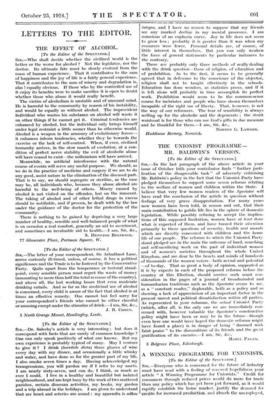THE UNIONIST PROGRAMME— MR. BALDWIN'S VERSION.
[To the Editor of the SPECTATOR.] - SI11,—In the last paragraph of the above article in your issue of October 18th your contributor finds "further justi- fication of the disagreeable task" of adversely criticising Mr. Baldwin's policy in the fact that the Unionist Party have pledged themselves to support some seven reforms relating to the welfare of women and children within the State. I believe that very few women readers of the Spectator will have read the conclusion of the article in question without feelings of very grave disapprobation. For many years now women have been told, in season and out, that their main contribution to public life lies in the sphere of domestic legislation. While possibly refusing to accept the implica- tions of this supposed limitation, women have at least done what is expected of them, and have turned their attention primarily to those questions of security, health and morals which are directly concerned with children and the home life of our people. The reforms to which the Unionist Party stand pledged are in the main the outcome of hard, searching and self-sacrificing work on the part of individual women and of women's societies throughout the whole United Kingdom, and are dear to the hearts and minds of hundreds of thousands of the women voters—both actual and potential --of to-day. That so great a body of opinion, supported as it is by experts in each of the proposed reforms before the country at this Election, should receive such scant con- sideration in the pages of a journal of broadminded and humanitarian traditions such as the Spectator seems to me, as a "constant reader," deplorable, both as a policy and as showing a lack of appreciation of an important factor in the present unrest and political dissatisfaction within all parties. As represented in your columns, the actual Unionist Party (which, after all, is the only one we are immediately con- cerned with, however valuable the Spectator's constructive policy might have been or may be in the future—though even here one would have hoped the domestic reforms might have found a place) is in danger of being "damned with faint praise" to the discomfiture of its friends and the great gratification of its enemies.—I am, Sir, &c.,
MABEL PAGAN.
5 Belgrare Place, Edinburgh.


























































 Previous page
Previous page